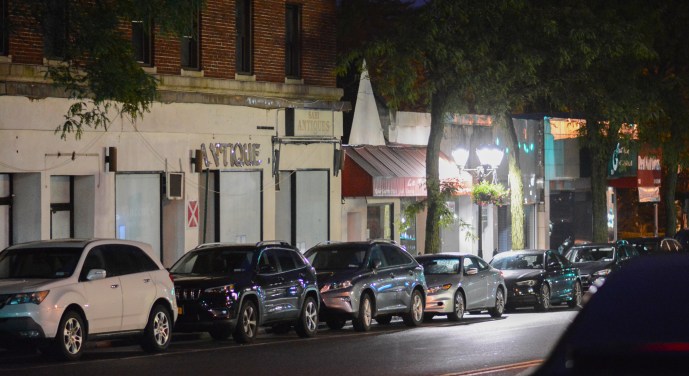It is a sight Francesca Carlow, president of the Nassau County Council of Chambers of Commerce, sees often.
Someone comes into Trio Hardware, her family’s hardware store in Plainview in business for 50 years, and asks what the best product for a certain job is. The person looks at the price. Then he whips out a phone, Carlow said, and finds it a few dollars cheaper on Amazon.
“Our older customers still, I would have to say 80 to 90 percent, come to the store because they want to know they’re going to have the right product for the right job,” Carlow said, “but you do look around now and there are fewer and fewer retail [outlets]. Even clothing stores are closing because people are shopping online.”
Carlow is one of many retailers that have been adjusting to the changing nature of retail as they seek to survive in the era of e-commerce behemoths like Amazon.
And while business has gone up and the overall vacancy rate appears to have gone down in the Long Island retail market, according to NAI Long Island, a commercial real estate firm that studies the Long Island and Queens real estate markets, some areas have not fared as well.
The firm found that in the fourth quarter of 2018, western Nassau had a retail vacancy rate of 4.4% and northern Nassau had a rate of 6.4%. At the same time in 2017, the rates were 2.8% and 4.2%, respectively.
Jay Corn, a founder of the Great Neck Plaza Business Improvement District, said the stores that are succeeding right now are national retailers with name power and more user-friendly policies.
Additionally, Corn said, retailers have made a shift toward something Amazon cannot bring: an experience.
“The nature of retail is changing drastically and it appears that the businesses that are replacing the retailers are service-oriented,” Corn said. “There’s certain things you can’t just get from Amazon. That’s the direction we’re going in.”
Hooshang Nematzadeh, the former Chamber of Commerce president in Great Neck and head of Nemat Development Group, said there are unique challenges when it comes to doing business in Nassau County.
There are high taxes that make up to half of the rents, he said. There is also little room for error in doing business, considering small businesses are trying to compete with Amazon and online shopping in general.
Nematzadeh said the continued loss of retailers requires major action and cooperation among entities, new programs and possible tax abatements to spur development.
“I believe that the problem of this magnitude requires input and cooperation from the county, town and villages together,” Nematzadeh said. “This is a multi-pronged problem.”
Bradley Diamond, a real estate broker who does retail work on Long Island and Queens, said he’s come to know first hand how difficult it is for businesses to open in the first place.
For some entrepreneurs, simple applications could run into the tens of thousands of dollars because of a combination of fees, needing to hire attorneys and architects, and the differing requirements of municipalities, Diamond said.
“People have to have the money and the financial stamina to wait six to eight months to up to a year for the permitting process,” Diamond said, adding that the “lack of streamlining” is acting as a deterrent.
Harold Citron, a retail analyst from Great Neck, which is trying to revitalize its downtown, said there is considerable talk about taxes and a lack of foot traffic being the issue.
But, Citron said the bigger factor is that people are either going to amall like Roosevelt Field or the Americana Shopping Center or going online.
“It’s a mix and match these days,” Citron said. “Young people are more comfortable with online purchases. They’re more comfortable with the blind transaction rather than developing the relationship you would have with a local shop.”
Still, Citron said the shift doesn’t mean the end of communities or downtowns. Horses and carriages were replaced by cars, for example, and the idea of being a programmer or video game maker was unimaginable just a few decades ago.
“There is still a market demand for businesses, for services, and the question is what comes next,” Citron said. “There’s always something that’s going to come next.”
Carlow said the Nassau Council of Chambers of Commerce has been working hard to try and even the playing field, lobbying for the taxation of third party internet sales to keep money local. Developers and landlords are also starting to see the problem, she said.
“Developers and landlords are finally getting the picture that you cannot be charging $45 per square foot and be expecting someone to pay,” Carlow said.
Despite the challenges, Carlow said she believes the smaller stores can pull through and encouraged people to shop local because the money would support the community.
“I think there will always be a place for mom and pops, but you also have to adapt and make a strategy,” Carlow said. “When I go to a different city or a different any place, I like to go to a ‘greasy spoon.’ I like to go to a local establishment so you can get a flavor of where you are.”

